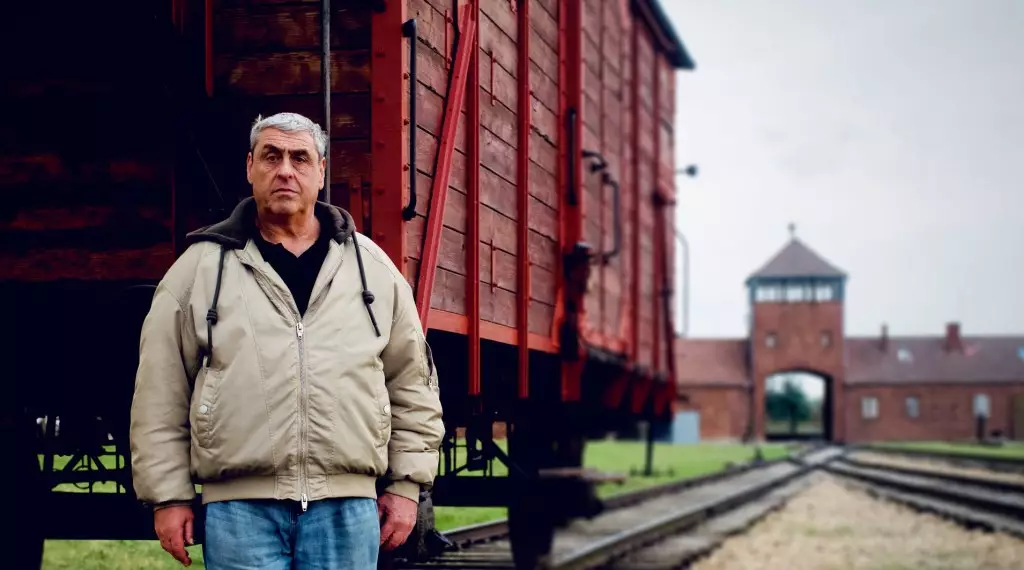In recent years, narratives surrounding the Holocaust have gained renewed interest, often highlighting personal stories of resilience, love, and survival. One such narrative is encapsulated in the journey of Gary Sokolov, the son of Holocaust survivors Lali and Gita Sokolov, who endured unimaginable hardships during their time as prisoners in Auschwitz. Following the success of the dramatized adaptation of Heather Morris’ bestselling novel, *The Tattooist of Auschwitz,* a new documentary titled *The Tattooist’s Son: Journey to Auschwitz* emerges, providing a deeply personal account of a son’s emotional quest to understand his family’s tumultuous history. This documentary not only seeks to illuminate the past but also serves as a poignant exploration of intergenerational trauma and healing.
The upcoming documentary centers on Gary Sokolov’s emotional pilgrimage back to Auschwitz, a site synonymous with pain and suffering but now also a place of remembrance and reflection. This venture promises to be both a personal narrative and a collective remembrance, intertwining Gary’s discoveries with the historical context of his parents’ experiences. Filmed across diverse locations, including Melbourne, Slovakia, and Poland, this 90-minute documentary encapsulates a variety of perspectives, allowing the audience to engage on both a personal and historical level.
Gary’s journey is particularly compelling because it highlights a significant aspect of Holocaust narratives: the silence often observed in families of survivors. Many children of Holocaust survivors grow up with limited discourse about their parents’ pasts, a phenomenon that Gary himself experienced. The lack of dialogue surrounding trauma can engender a sense of disconnect from one’s heritage, leading to a longing for understanding and closure. Thus, as he retraces his father’s steps, the film unpicks a familial tapestry woven from love, endurance, and silence. It confronts intergenerational trauma while simultaneously charting Gary’s attempts to reconcile with the realities of his family lineage.
The documentary’s narrative arc promises a blend of personal testimonies, archival material, and dramatized sequences from the series, enriching its storytelling. By integrating clips of Lali Sokolov alongside the actors who portrayed him and Gita, the documentary is poised to pose crucial questions about memory and representation. This approach embodies a holistic examination of not just the events that transpired in Auschwitz, but also the legacies carried forward by the survivors and their descendants.
As Gary interacts with significant individuals from the drama’s production—such as Heather Morris and the actors representing his parents—viewers can witness the profound connections forged through shared history and storytelling. Each meeting holds promise for revelations, as they bridge the divide between artistic interpretations and the painful truths of history. Such exchanges can illuminate various facets of Lali and Gita’s love story, hinting at the resilience of the human spirit even in the darkest times.
The timing of the documentary’s release aligns with the 80th anniversary of Auschwitz’s liberation, a moment crucial for commemoration and reflection. As Dan Korn of Hearst Networks emphasizes, acknowledging such historic milestones is vital to understanding ongoing discussions about Holocaust education and remembrance. This documentary fits within a broader context of projects striving to preserve collective memory, ensuring that the stories of survivors like Lali and Gita are not relegated to historical obscurity.
By presenting Gary’s journey as a deeply personal and collective homage, the documentary serves as a necessary reminder of the essential narratives that are often overshadowed in discussions about the Holocaust. Through this lens, audiences can connect emotionally with the subject matter, fostering a greater awareness of how these historical events reverberate through generations.
Ultimately, *The Tattooist’s Son: Journey to Auschwitz* stands as a testament to the power of storytelling in bridging gaps of understanding and healing. It reaffirms the significance of reclaiming the past, not merely as a fixed series of historical events but as a living narrative that continues to shape identities and relationships. In a world where the echoes of history can sometimes feel distant or diluted, efforts like these play a crucial role in ensuring that the lessons from the past endure, creating pathways for empathy, recognition, and, ultimately, peace.

